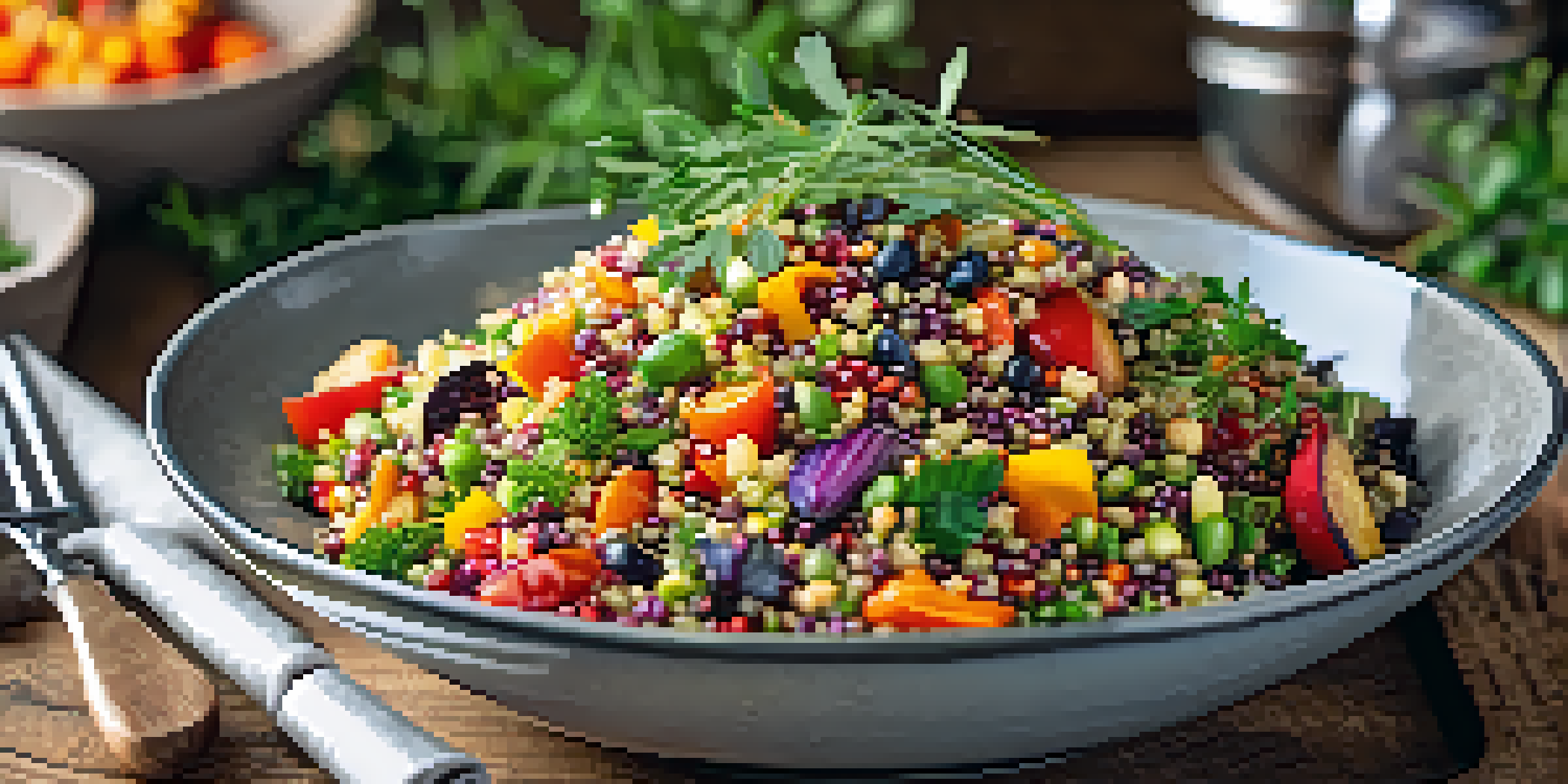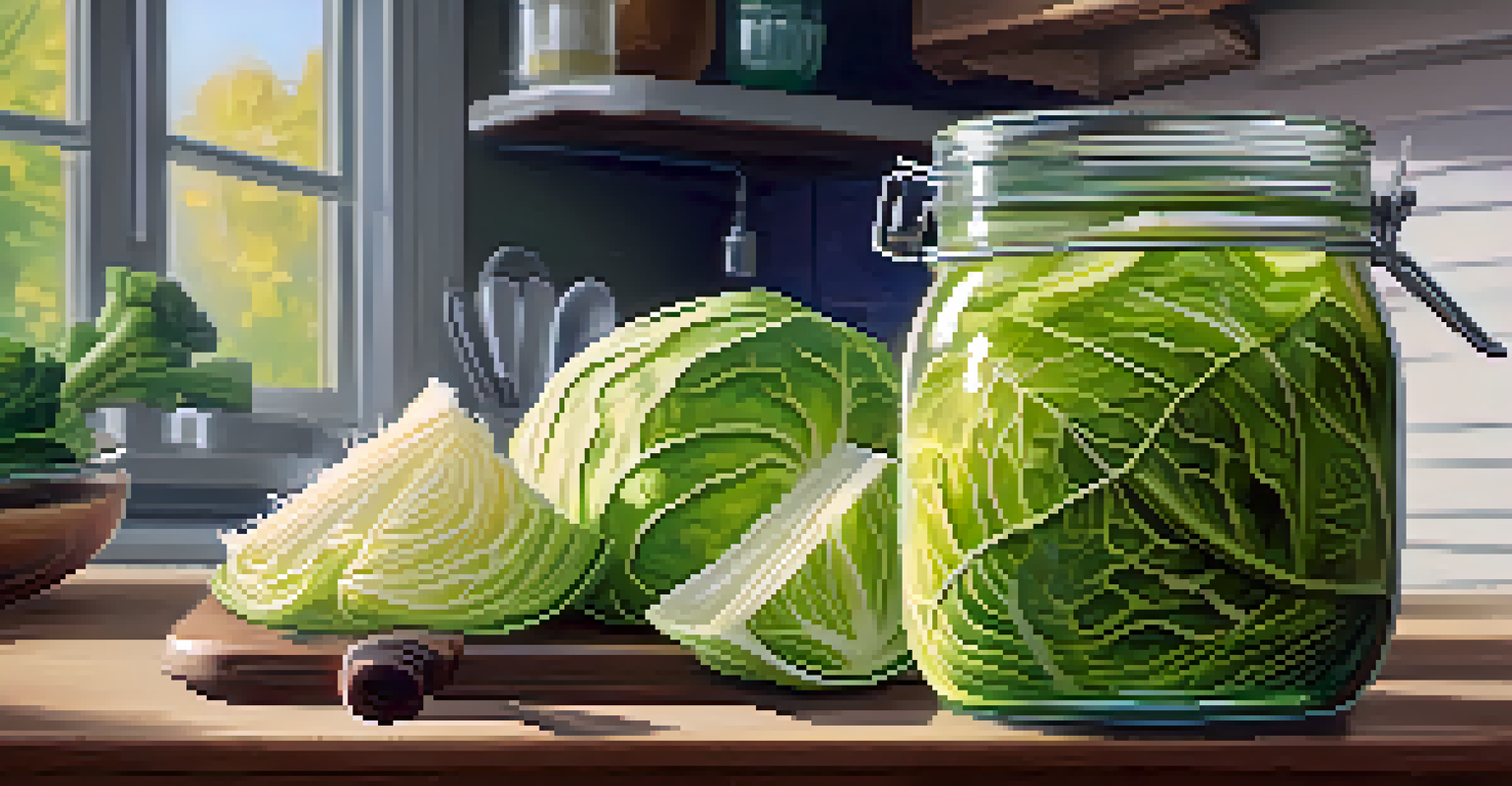Cooking for Gut Health: Nutritious Techniques to Try

Understanding the Gut: Why It Matters for Health
The gut is often referred to as our 'second brain' because it plays a crucial role in our overall health. It’s home to trillions of microorganisms that aid digestion, support immunity, and even influence mood. This complex ecosystem is sensitive to what we eat, which makes it essential to focus on nutrition for optimal gut function.
Let food be thy medicine and medicine be thy food.
When you nourish your gut with the right foods, you're not just improving digestion; you're enhancing your body's ability to absorb nutrients. A healthy gut can also help prevent various ailments, from bloating to chronic diseases. This is why understanding gut health is so important for anyone looking to improve their well-being.
In this article, we'll explore some nutritious cooking techniques that can support gut health. By making small changes in your kitchen, you can create meals that not only taste great but also help your digestive system thrive.
Fermentation: Harnessing the Power of Probiotics
Fermentation is a magical cooking technique that transforms ordinary foods into gut-friendly powerhouses. Think of yogurt, kimchi, and sauerkraut; these foods are packed with probiotics, which are beneficial bacteria that promote a healthy gut. Incorporating fermented foods into your diet can help restore balance to your microbiome.

You can easily add fermented foods to your meals by using them as toppings, side dishes, or even in smoothies. For example, a dollop of yogurt can enhance your morning smoothie while adding a creamy texture. Plus, making your own fermented foods at home can be a fun and rewarding project.
Gut Health Impacts Overall Well-being
A healthy gut is crucial for digestion, immunity, and even mood regulation, making nutrition essential for optimal gut function.
If you're new to fermentation, start with something simple like homemade sauerkraut. All it takes is cabbage and salt, and over time, you'll witness the transformation into a tangy, probiotic-rich side that enhances any meal.
Cooking with Whole Foods: A Gut-Friendly Approach
Whole foods are minimally processed and packed with nutrients, making them a cornerstone of gut health. Incorporating a variety of fruits, vegetables, whole grains, and legumes into your meals can provide essential fiber, which supports digestion and keeps you feeling full. The more colorful your plate, the better for your gut!
The gut is the gateway to health.
For instance, consider a hearty quinoa salad loaded with roasted vegetables and a sprinkle of seeds. This dish not only looks inviting but also delivers a powerhouse of nutrients that fuel your gut flora. The fiber from the vegetables and grains acts like a broom, sweeping through your system and promoting regularity.
Choosing whole foods over processed options not only benefits your gut but can also improve your overall health. It’s an easy switch that can have a lasting impact on how you feel day to day.
The Role of Fiber: Fueling Your Gut Microbiome
Fiber is a superstar when it comes to gut health. It acts as food for the beneficial bacteria in your gut, helping them thrive and multiply. By including a variety of fiber sources in your diet, you can promote a diverse microbiome, which is key for optimal digestion and health.
Foods rich in fiber include fruits, vegetables, whole grains, and legumes. For example, a bowl of oatmeal topped with berries and seeds can provide a delicious and nutritious breakfast that supports your gut. Plus, fiber helps regulate bowel movements and can prevent issues like constipation.
Fermented Foods Boost Gut Flora
Incorporating fermented foods like yogurt and sauerkraut into your diet can enhance gut health by introducing beneficial probiotics.
To up your fiber intake, aim for foods that contain both soluble and insoluble fiber. This combination not only helps feed your gut bacteria but also supports overall digestive health, making it easier for your body to absorb nutrients.
Mindful Cooking: Enhancing Your Meal Experience
Mindful cooking is all about being present and intentional in the kitchen. When you focus on the process, you can create meals that nourish not just your body but also your mind. This approach helps you appreciate the ingredients you’re using and the impact they have on your gut health.
Try setting aside time to prepare meals without distractions. As you chop, sauté, or blend, think about how each ingredient contributes to your health. For instance, when making a vegetable stir-fry, consider the vibrant colors and textures and how they work together to support your well-being.
This practice can transform your cooking from a mundane task into a joyful experience. Plus, when you eat mindfully, you're likely to enjoy your meals more and listen to your body's signals of hunger and fullness, which is essential for overall gut health.
Hydration: The Overlooked Key to Gut Health
Staying hydrated is often overlooked when discussing gut health, but it plays a significant role in digestion. Water helps break down food so that your body can absorb nutrients effectively. It also aids in the movement of food through the digestive tract, preventing issues like bloating and constipation.
Consider infusing your water with gut-friendly ingredients like lemon, ginger, or mint to make hydration more enjoyable. These additions not only enhance flavor but can also provide their own health benefits. For instance, ginger is known for its anti-inflammatory properties, which can soothe the digestive system.
Whole Foods Promote Digestive Health
Choosing whole, minimally processed foods packed with fiber can support digestion and improve overall health.
Aim to drink plenty of water throughout the day, especially when consuming high-fiber foods. Keeping your body well-hydrated ensures that your digestive system functions smoothly, contributing to overall gut health.
Cooking Techniques: Steaming and Sautéing for Digestive Ease
The way you cook your food can significantly impact its digestibility. Techniques like steaming and sautéing are not only quick but also help retain the nutrients in your ingredients. Steaming, for instance, preserves vitamins and minerals that can be lost during boiling, making veggies more beneficial for your gut.
Sautéing is another great option, as it allows you to cook foods quickly while adding flavor. Using healthy fats like olive oil can enhance the absorption of fat-soluble vitamins, which are vital for your overall health. Think of a colorful stir-fry with seasonal vegetables tossed in a bit of olive oil for a gut-friendly dish.

By choosing cooking methods that preserve nutrients, you ensure that your meals are not only tasty but also beneficial for your gut. Experimenting with different techniques can keep your cooking exciting while promoting digestive health.